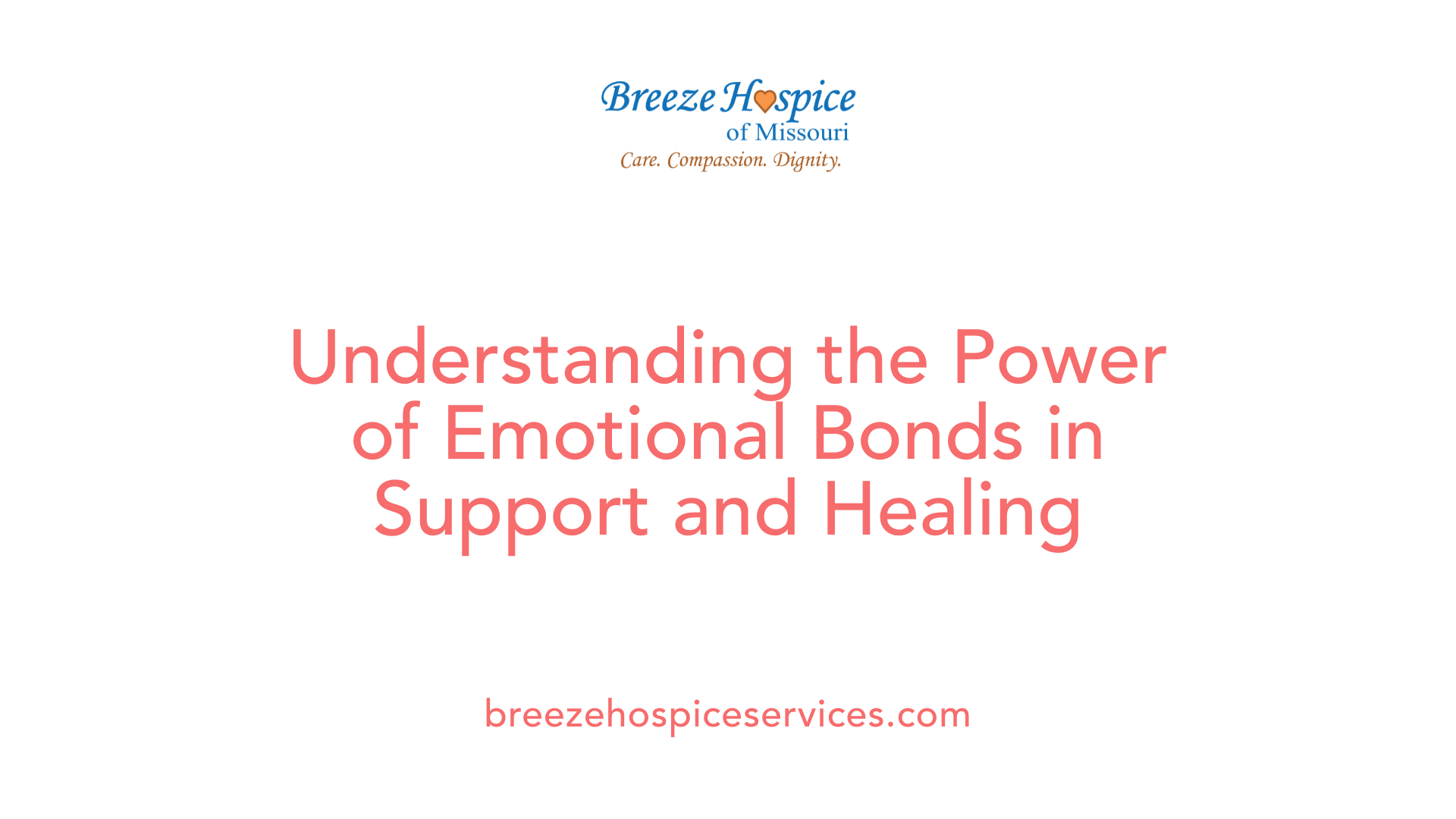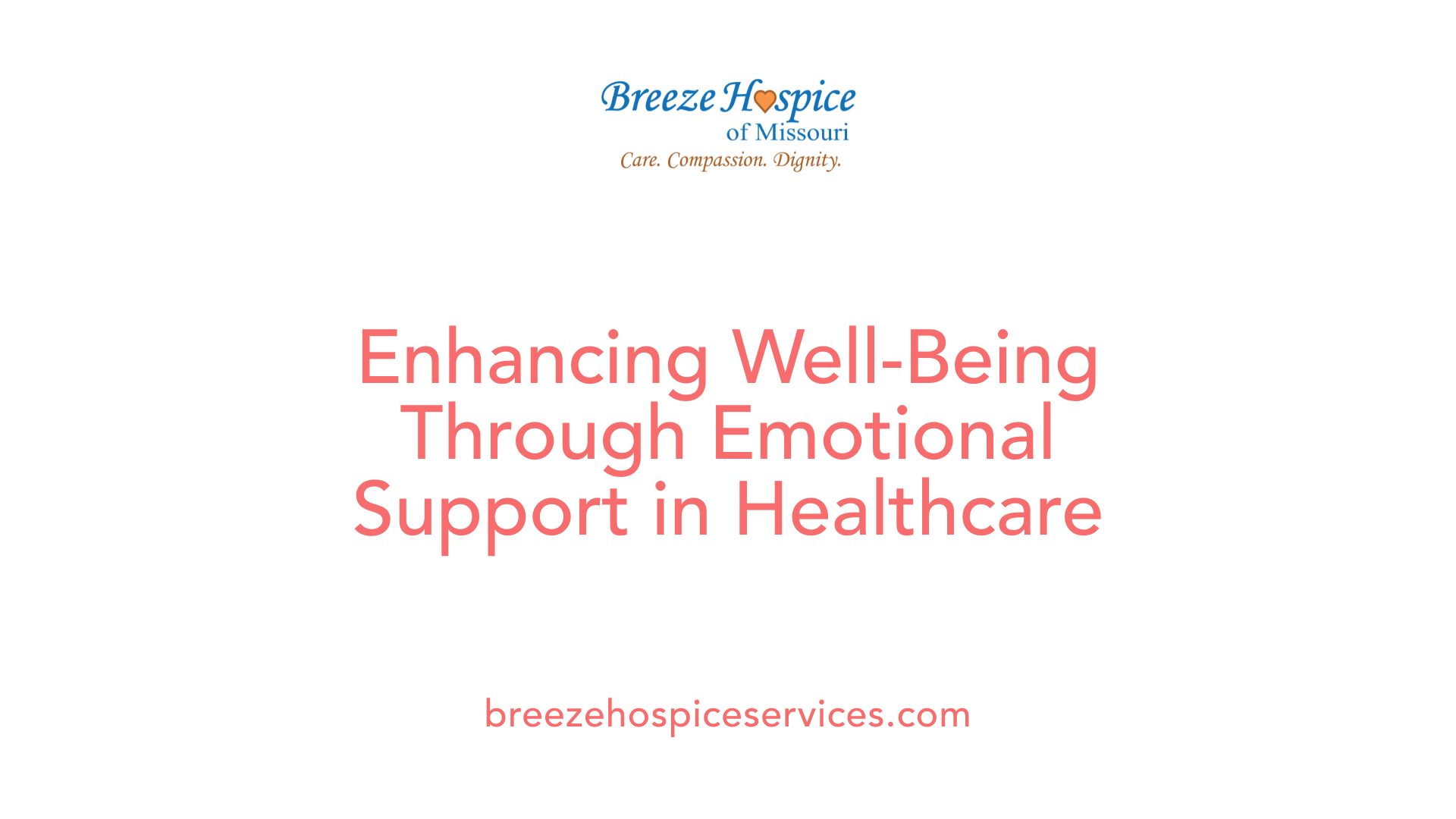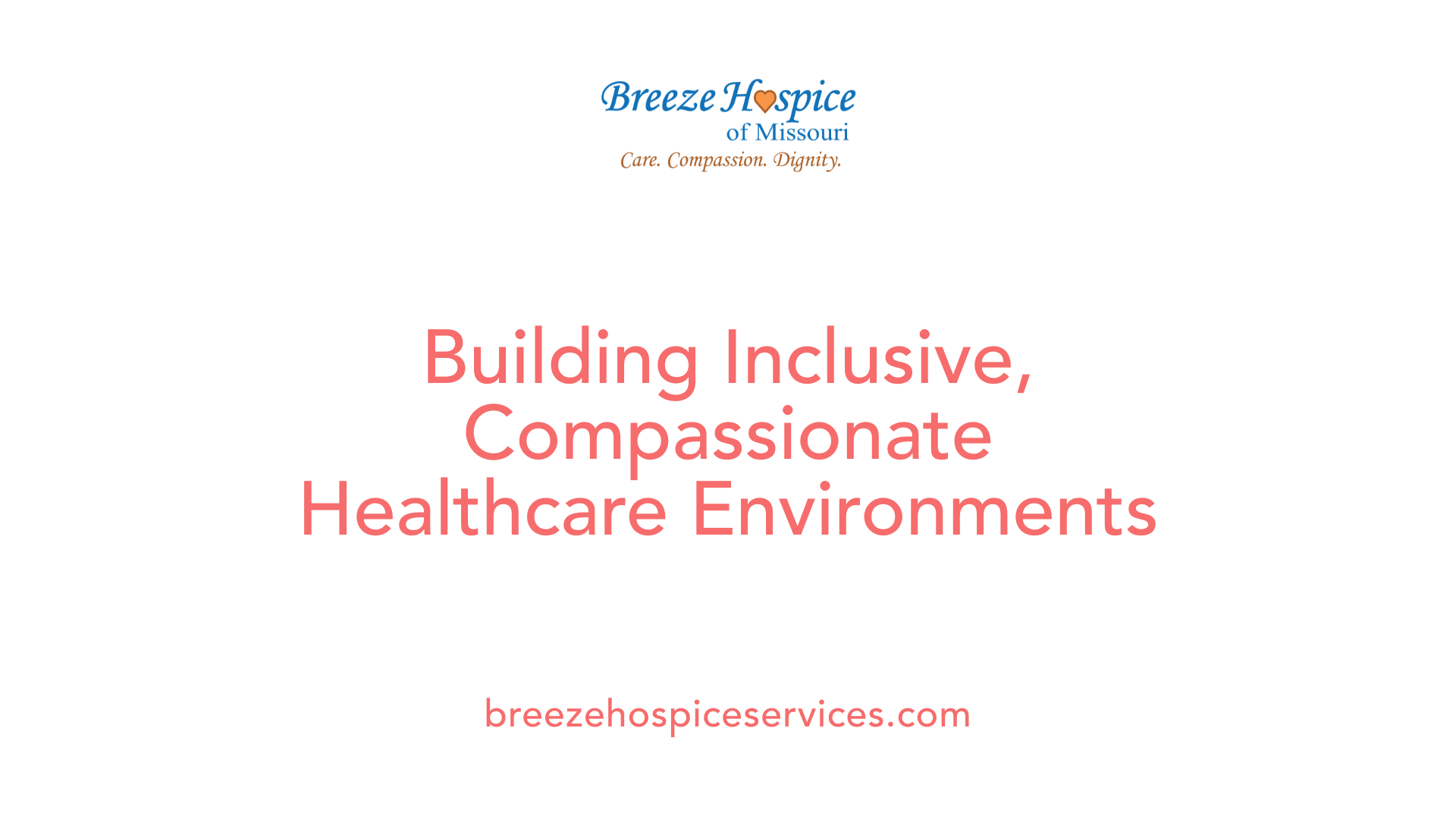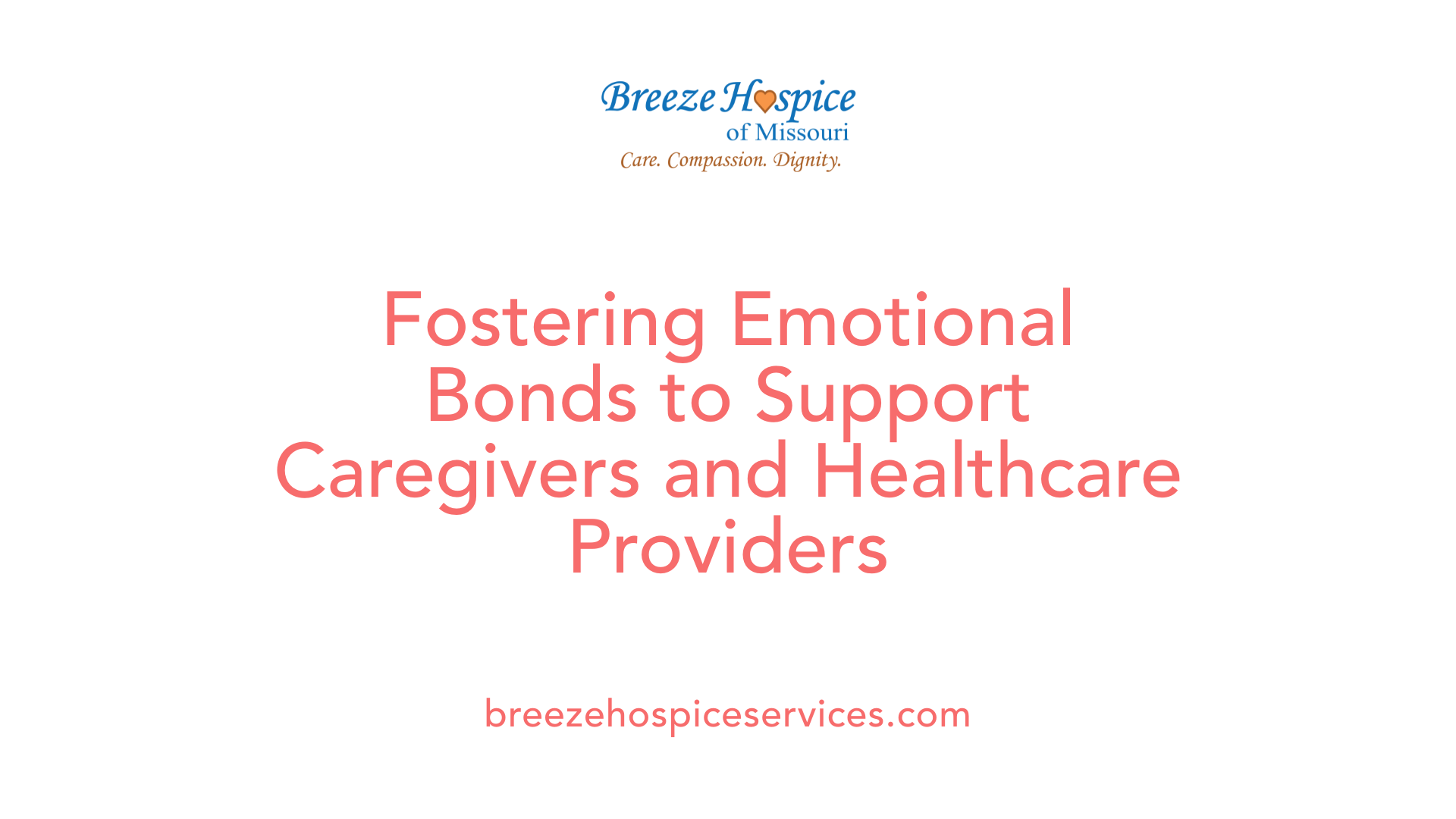The Role of Emotional Connection in Providing Daily Living Support
July 25, 2025
Fostering Emotional Bonds to Enhance Daily Support

Understanding the Significance of Emotional Connection in Caregiving Contexts
Emotional connection plays a crucial role in delivering effective daily living support, especially in healthcare, caregiving, and community settings. It influences support behaviors, enhances well-being, and fosters resilient, meaningful relationships. This article explores how emotional bonds impact care practices, the underlying mechanisms, and effective strategies to strengthen these connections for better health outcomes and quality of life.
Core Components of Emotional Support in Healthcare and Caregiving
What is the role of emotional support in healthcare and caregiving?
Emotional support is a fundamental element in both healthcare and caregiving settings. It helps foster mental well-being by creating a foundation of warmth, kindness, and understanding. This support encourages open communication, allowing patients and caregivers to share their feelings, fears, and experiences honestly. When individuals feel supported, they are more likely to engage actively in their treatment or care plans, which can lead to improved health outcomes.
In the context of caregiving, emotional support plays a crucial role in managing stress, anxiety, and grief. It offers comfort and reassurance, helping individuals build resilience during difficult times. Caregivers who provide emotional support can promote a sense of safety and trust, which aids in recovery and emotional stability.
Professional resources such as crisis helplines, mental health programs, and community services are vital for vulnerable populations. These resources ensure individuals experiencing trauma, distress, or mental health challenges like depression or suicidal thoughts receive appropriate care. Emotional support is especially important for groups like LGBTQ+ youth or those facing unique challenges such as school refusal. Combining emotional support with evidence-based interventions can address underlying issues like anxiety and prevent long-term developmental impacts.
Overall, emotional support enhances not just physical recovery but also improves quality of life. It equips individuals with the emotional tools needed to navigate health crises, fostering resilience and psychological well-being across diverse caregiving scenarios.
Building Trust and Trustworthiness in Care Relationships
Why is emotional support significant during challenging times?
Emotional support plays a vital role in helping individuals cope during difficult periods. It provides reassurance, comfort, and a sense of safety, allowing people to manage stress more effectively. When someone feels seen, understood, and valued, even amidst adversity, it can lift mental burdens and boost self-esteem.
Strong social connections built through warmth, kindness, and genuine empathy serve as buffers against feelings of loneliness and despair. These bonds foster resilience, enabling individuals to face challenges with greater confidence.
In caregiving settings, sharing positive emotional experiences, such as laughter or heartfelt conversations, deepens bonds and enhances trust. Emotional connection encourages openness and vulnerability, which are crucial for building a safe and nurturing environment.
Healthy relationships grounded in authentic communication and mutual compassion promote growth and healing. Overall, emotional support during tough times offers not only immediate relief but also long-term benefits for mental and physical well-being.
Strategies for Effective Emotional Support in Daily Interactions
What are effective strategies for fostering emotional support and connection in caregiving?
Building emotional support in caregiving involves several practical approaches that foster trust, understanding, and a sense of safety. Active listening and empathetic engagement are foundational; caregivers should give their full attention, listen without judgment, and reflect on what the care recipient shares. This not only validates their feelings but also strengthens the bond.
Encouraging open and honest communication is equally vital. Caregivers can ask open-ended questions, create a safe space for expression, and demonstrate patience, allowing individuals to share their emotions comfortably. This openness fosters mutual understanding and reassurance.
Patience and reassurance during interactions help in reducing anxiety, especially for those dealing with speech difficulties, cognitive decline, or emotional distress. Showing consistent kindness and understanding creates a supportive environment.
Facilitating social interactions outside of individual care, such as through community activities or hobbies, further reduces feelings of isolation. Providing transportation or assisting with participation in social events helps maintain a sense of belonging.
Developing a relationship based on compassion and consistency, alongside ongoing training for caregivers, strengthens emotional bonds. These practices ensure that emotional support is embedded in daily caregiving, enhancing both the caregiver's and recipient’s well-being.
| Strategy | Description | Additional Benefits |
|---|---|---|
| Active listening | Giving undivided attention, reflecting feelings, asking clarifying questions | Builds trust, validates feelings |
| Open communication | Encouraging honest dialogue, creating a supportive space, being patient | Fosters understanding and emotional safety |
| Offering reassurance | Being patient, providing comfort, and affirming feelings | Reduces anxiety and emotional distress |
| Facilitating social ties | Supporting participation in community or hobbies, arranging activities | Decreases loneliness, promotes wellbeing |
Implementing these strategies creates a nurturing caregiving environment where emotional needs are prioritized, cultivating meaningful connections that positively impact mental and physical health.
The Psychological and Relational Mechanisms Behind Emotional Connection’s Impact

How do emotional bonds influence support behaviors and outcomes?
Emotional bonds are fundamental in shaping how support is exchanged and received among individuals. When people share strong emotional connections, they build trust and empathy, which encourage more genuine and effective support behaviors. These bonds foster a sense of safety, making individuals feel comfortable to express their needs, vulnerabilities, and concerns without fear of judgment.
Support outcomes improve significantly when emotional bonds are present because they prompt reciprocal care and cooperation. For example, a person with a strong bond is more likely to seek help during stressful times, knowing they will be met with understanding and compassion. Such relationships also motivate individuals to participate actively in mutual support, enhancing mental health and emotional stability.
The role of emotional intelligence (EI) further amplifies these effects. EI involves recognizing, understanding, and managing one’s own emotions and empathizing with others. Higher EI helps deepen bonds by improving communication, fostering mutual respect, and resolving conflicts constructively.
Developing emotional intelligence can be achieved through self-awareness exercises, seeking constructive feedback, and engaging in relationship-building activities. When individuals are emotionally skilled, they are more adept at offering support that resonates with others' needs, ultimately leading to more positive outcomes.
The influence of emotional bonds on support behaviors extends to the community level as well. Trusting relationships increase adherence to care plans and encourage collective efforts in caregiving or mental health initiatives. Access to credible resources, such as mental health services and crisis intervention, further reinforces these bonds, offering a comprehensive support network that nurtures emotional well-being.
The Impact of Emotional Connection on Physical and Mental Well-being in Seniors and Patients

How does emotional support enhance the well-being of seniors and patients?
Supporting emotional health significantly benefits overall health, especially for seniors and patients facing health challenges. Emotional support can improve mental, physical, and cognitive health while also increasing lifespan. For example, caregivers who show warmth and kindness help elevate seniors' self-esteem through encouragement and acknowledgment of personal achievements.
A caring caregiver’s presence also reduces stress, making it easier for seniors to manage daily chores, personal care, and healthcare needs. Personalized care plans that account for a person's interests, personality, and emotional state help meet their specific emotional needs, fostering a sense of dignity and independence.
Engaging in regular social and emotional activities, such as puzzles, reading, or memory exercises, can lower the risk of cognitive decline, including Alzheimer’s disease. Additionally, assisting seniors with technology—like smartphones or video calls—helps them stay digitally connected, which boosts their emotional resilience and sense of belonging.
Overall, emotional support fosters a supportive environment where seniors and patients feel valued, understood, and connected, positively influencing both mental and physical health.
Community and Organizational Strategies to Foster Emotional Connection
 Promoting shared understanding among staff is fundamental in embedding emotional support into healthcare environments. By cultivating a common language and shared goals related to emotional well-being, team members can better coordinate care and provide consistent, compassionate support to patients and residents. Training programs that enhance providers' capacity to recognize emotional needs and deliver empathetic responses are essential for creating a culture that values emotional connection.
Promoting shared understanding among staff is fundamental in embedding emotional support into healthcare environments. By cultivating a common language and shared goals related to emotional well-being, team members can better coordinate care and provide consistent, compassionate support to patients and residents. Training programs that enhance providers' capacity to recognize emotional needs and deliver empathetic responses are essential for creating a culture that values emotional connection.
Organizational support also involves creating inclusive and supportive environments. This includes implementing policies and practices that foster respect, dignity, and a sense of belonging for all individuals, regardless of background or health status. Developing personalized care plans tailored to each person's emotional and social needs ensures that care delivery respects individual preferences and promotes emotional health.
Facilitating peer networking and team-building initiatives helps staff share strategies and experiences, strengthening their ability to support emotional connections. Additionally, providing access to resources such as mental health training, counseling services, and community engagement programs empowers staff to address emotional issues effectively.
Altogether, organizational strategies focused on promoting shared understanding, enhancing staff capacity, and fostering inclusivity play a critical role in embedding emotional support within healthcare settings. These approaches not only improve patient and resident well-being but also boost staff satisfaction and overall quality of care.
Summary Table:
| Strategy | Implementation Examples | Expected Outcomes |
|---|---|---|
| Promoting shared understanding | Regular team meetings on emotional support practices | Consistent, empathetic care; improved team cohesion |
| Organizational training and support | Workshops on active listening and emotional empathy | Enhanced staff skills; better patient interactions |
| Creating inclusive environments | Policies that support diversity and accessibility | Feelings of safety and belonging among all individuals |
| Facilitating peer networking | Staff peer support groups and mentorship programs | Shared knowledge; reduced burnout |
| Personalization of care plans | Individual assessments of emotional needs | Tailored support; higher patient satisfaction |
Implementing these strategies ensures emotional support becomes an integral aspect of patient care, contributing to healthier, more resilient communities.
The Benefits of Emotional Support for Caregivers and Support Providers

Why do humans need emotional connection?
Humans inherently seek emotional bonds because these connections provide a sense of love, belonging, and support. Such bonds are essential in helping individuals navigate life's challenges and maintain emotional well-being. Deep emotional relationships foster trust, vulnerability, and mutual compassion, which contribute to better mental and physical health.
Authentic connections, characterized by trust and openness, create a safe space for individuals to express themselves and grow. Building these bonds starts with self-awareness and effective communication, such as understanding different love languages and establishing healthy boundaries.
Research shows that strong social and emotional ties can reduce stress, lower the risk of illness, and promote resilience. Whether among patients, caregivers, or support providers, these relationships serve as a foundation for emotional stability and overall well-being.
In healthcare and caregiving settings, fostering caring relationships enhances job satisfaction and can improve care quality. When providers feel connected and appreciated, they are more engaged and motivated, which benefits both their own mental health and the patients they serve.
Creating environments that emphasize warmth, genuine listening, and social connection enables caregivers and providers to offer emotional support effectively. This, in turn, boosts emotional resilience, reduces burnout, and nurtures a positive, supportive workplace and care environment.
Enhancing Support Through Emotional Connection
Building and nurturing emotional bonds are not just supplementary elements but central to effective daily living support. They foster trust, reduce feelings of loneliness, and promote overall well-being for both recipients and providers. By understanding the psychological mechanisms and adopting strategic approaches, caregivers, healthcare professionals, and community members can ensure that emotional connection remains at the heart of supportive relationships. Such integration leads to better health outcomes, increased resilience, and a compassionate, person-centered approach that enriches lives in everyday support scenarios.
References
- Kindness, Listening, and Connection: Patient and Clinician Key ...
- The Importance of Connections on Our Well-Being | Berkeley Exec Ed
- The Role of Emotional Support In Home Care Services | RT Medical
- The Role of Social Connections in Mental Wellness
- Emotional and Instrumental Support Provision Interact to Predict ...
- The Role of Emotional Support in Senior Care | Oxford
- How Emotional Connection Can Strengthen Relationships and How ...
- The Emotional Benefits of Receiving Home Care Support
- Providing emotional support and daily emotional well-being among ...
- How to show emotional support: Tips and examples



































































































